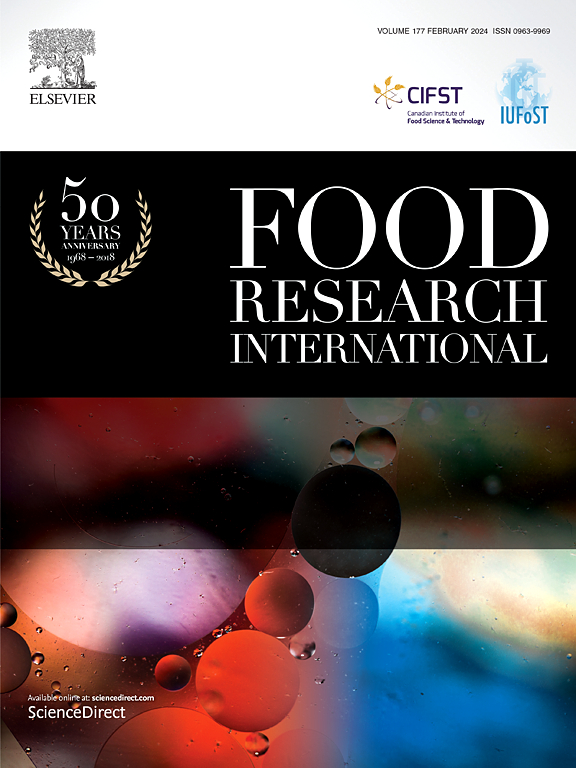CiLi (Rosa roxburghii Tratt.) polyphenols improve colitis via gut microbiota-lipid mediator-immunity axis
IF 7
1区 农林科学
Q1 FOOD SCIENCE & TECHNOLOGY
引用次数: 0
Abstract
Dysbiosis of gut microbiome is one of the most important factors leading to inflammatory bowel disease (IBD). Intake of phytochemicals from fruits and vegetables is an effective way to improve IBD, but how these bioactivators regulate gut microbiota to exert healthy effects remains unclear. Here, we found that pretreatment with CiLi juice, particularly its polyphenol component, alleviated dextran sulfate sodium (DSS)-induced colitis while preserving intestinal barrier integrity. CiLi polyphenols (CL_PP) reduced inflammation and oxidative stress in colon tissue and enriched fecal short-chain fatty acids. Importantly, CL_PP significantly regulated the gut microbiome diversity, increasing beneficial bacteria (e.g., Clostridia_UCG-014, f_Muribaculaceae and Ileibacterium_valens) while decreasing harmful bacteria (Escherichia-Shigella and Romboutsia). Multiomics analysis revealed that CL_PP upregulated bioactive lipid metabolites, particularly those derived from polyunsaturated fatty acids (e.g., resolvin D2, prostaglandin A1, and glycerophosphocholine) related gene expressions (Pltp, Alox15 and Pld4). Additionally, CL-PP downregulated the oxidative stress markers (oxidized glutathione and glutathione peroxidase 3), and immune cell markers (CD8 and CD68). Fecal microbiota transplantation confirmed that the fecal microbiota from CL_PP-treated mice exhibited anti-colitis effects. These effects were diminished in antibiotic-treated mice, underscoring the importance of the gut microbiota in mediating the CL_PP's anti-inflammatory benefits. This study suggests that CL_PP is a potential modulator of gut microbiome dysbiosis for the prevention and treatment of colitis.

肠道微生物群失调是导致炎症性肠病(IBD)的最重要因素之一。从水果和蔬菜中摄入植物化学物质是改善 IBD 的有效方法,但这些生物活化剂如何调节肠道微生物群以发挥健康作用仍不清楚。在这里,我们发现使用慈利果汁(尤其是其多酚成分)进行预处理可缓解葡聚糖硫酸钠(DSS)诱导的结肠炎,同时保持肠道屏障的完整性。慈利多酚(CL_PP)可减少结肠组织中的炎症和氧化应激,并丰富粪便中的短链脂肪酸。重要的是,CL_PP 能显著调节肠道微生物组的多样性,在增加有益菌(如梭菌_UCG-014、f_Muribaculaceae 和 Ileibacterium_valens)的同时减少有害菌(志贺氏杆菌和 Romboutsia)。多组学分析表明,CL_PP 能上调生物活性脂质代谢物,尤其是源自多不饱和脂肪酸的代谢物(如溶血素 D2、前列腺素 A1 和甘油磷酸胆碱)相关基因(Pltp、Alox15 和 Pld4)的表达。此外,CL-PP 还能下调氧化应激标志物(氧化谷胱甘肽和谷胱甘肽过氧化物酶 3)和免疫细胞标志物(CD8 和 CD68)。粪便微生物群移植证实,经 CL_PP 处理的小鼠粪便微生物群具有抗结肠炎的作用。抗生素处理过的小鼠的这些效果减弱,这突出了肠道微生物群在介导 CL_PP 的抗炎作用方面的重要性。这项研究表明,CL_PP 是一种潜在的肠道微生物群失调调节剂,可用于预防和治疗结肠炎。
本文章由计算机程序翻译,如有差异,请以英文原文为准。
求助全文
约1分钟内获得全文
求助全文
来源期刊

Food Research International
工程技术-食品科技
CiteScore
12.50
自引率
7.40%
发文量
1183
审稿时长
79 days
期刊介绍:
Food Research International serves as a rapid dissemination platform for significant and impactful research in food science, technology, engineering, and nutrition. The journal focuses on publishing novel, high-quality, and high-impact review papers, original research papers, and letters to the editors across various disciplines in the science and technology of food. Additionally, it follows a policy of publishing special issues on topical and emergent subjects in food research or related areas. Selected, peer-reviewed papers from scientific meetings, workshops, and conferences on the science, technology, and engineering of foods are also featured in special issues.
 求助内容:
求助内容: 应助结果提醒方式:
应助结果提醒方式:


